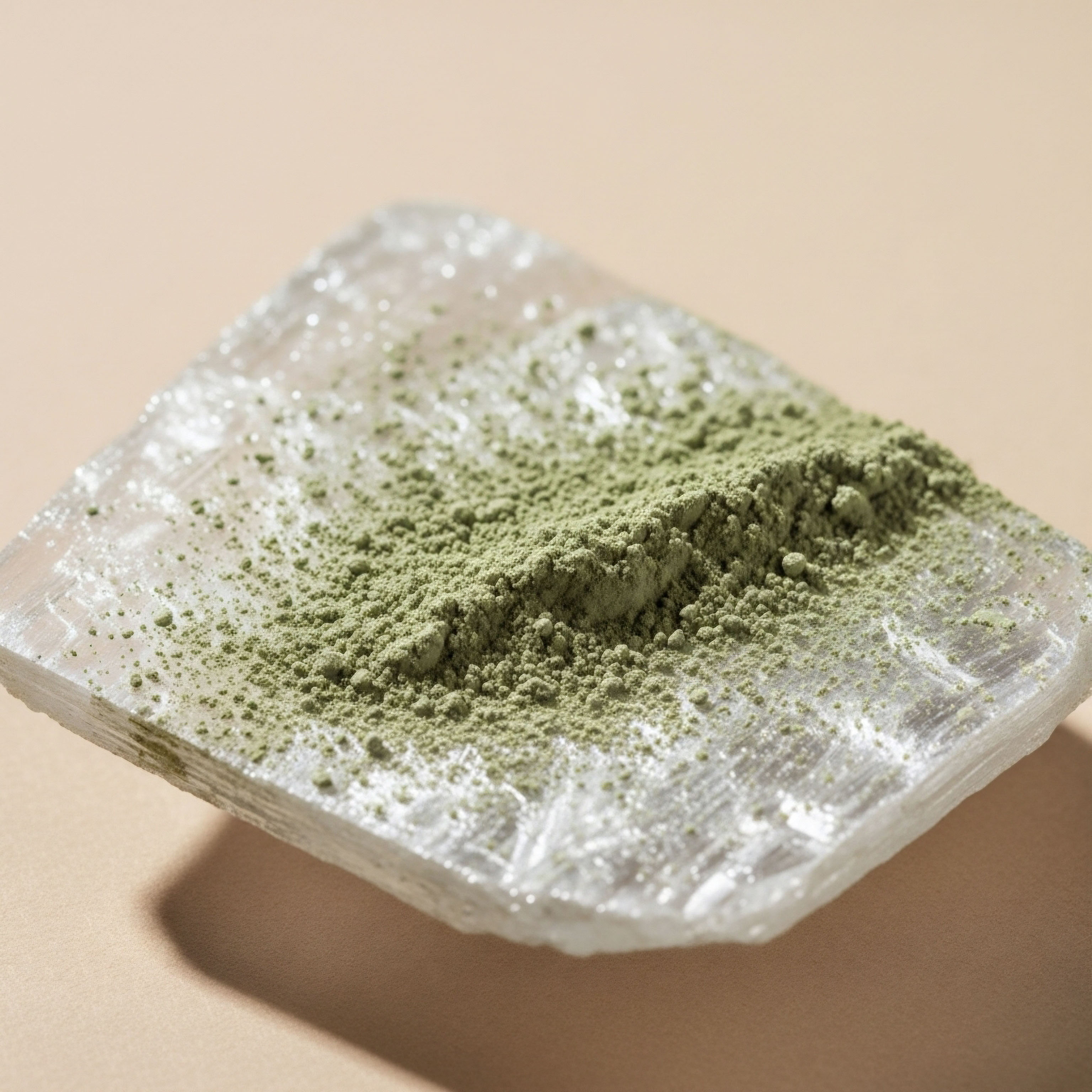

Fundamentals
Have you ever experienced moments where your mental sharpness seems to wane, where the clarity that once defined your thoughts feels clouded, or where your emotional landscape shifts without a clear reason? Many individuals describe a subtle, yet persistent, decline in cognitive vitality or a change in mood as they progress through different life stages.
This experience can be disorienting, prompting questions about what might be occurring within the body’s intricate systems. Such shifts are not merely a part of aging; they often signal deeper biological adjustments, particularly within the endocrine system, which orchestrates a symphony of biochemical processes.
Understanding your body’s internal messaging service, the endocrine system, provides a powerful lens through which to view these changes. Hormones, these vital chemical messengers, travel throughout your bloodstream, influencing nearly every cell and system, including the brain.
When we consider the long-term neurological implications of optimizing testosterone, we are truly examining how a foundational endocrine agent shapes the very architecture and function of your mind. This exploration moves beyond a simple definition of testosterone to consider its profound connection to overall well-being.
Testosterone, often recognized for its role in male reproductive health, holds a much broader influence across the human body, impacting both men and women. Its presence is felt in muscle development, bone density, and energy levels. Less commonly discussed, yet equally significant, is its pervasive influence on the central nervous system.
Androgen receptors, which respond to testosterone and its derivatives, are widely distributed throughout the brain, including regions vital for memory, mood regulation, and executive function. This widespread distribution underscores testosterone’s direct involvement in neural activity.
Testosterone acts as a crucial neurosteroid, influencing brain function and structure through direct receptor interactions and metabolic pathways.
The brain itself is a dynamic organ, constantly adapting and recalibrating. Hormones like testosterone play a significant role in this ongoing process, affecting aspects such as neurogenesis, the creation of new neurons, and synaptic plasticity, the ability of neural connections to strengthen or weaken over time.
A decline in optimal testosterone levels, often associated with advancing age or specific health conditions, can therefore contribute to changes in cognitive performance and emotional balance. Recognizing these connections is the initial step toward understanding how personalized wellness protocols can support sustained mental acuity and emotional stability.

The Endocrine System and Brain Communication
The endocrine system operates as a sophisticated communication network, with hormones acting as signals that direct various bodily functions. The brain, as the central processing unit, is both a recipient and a sender of these hormonal messages. For instance, the Hypothalamic-Pituitary-Gonadal (HPG) axis represents a classic example of this intricate feedback loop.
The hypothalamus in the brain signals the pituitary gland, which then signals the gonads (testes in men, ovaries in women) to produce testosterone and other sex hormones. This axis ensures that hormone levels are maintained within a healthy range, responding to the body’s needs.
When this delicate balance is disrupted, whether by age, stress, or other factors, the effects can ripple throughout the entire system, including the brain. Symptoms such as diminished concentration, difficulty with recall, or shifts in emotional resilience can often be traced back to these underlying hormonal fluctuations. A comprehensive understanding of these biological underpinnings provides a foundation for exploring how targeted interventions can help restore equilibrium and support neurological health over the long term.


Intermediate
Addressing symptoms related to hormonal changes requires a precise and individualized strategy. Clinical protocols for testosterone optimization are designed to recalibrate the endocrine system, aiming to restore physiological balance and support overall well-being, including neurological function. These protocols are not one-size-fits-all; they are tailored to distinct patient groups, considering their unique biological needs and health objectives.

Testosterone Optimization Protocols for Men
For middle-aged to older men experiencing symptoms of diminished testosterone, Testosterone Replacement Therapy (TRT) often involves weekly intramuscular injections of Testosterone Cypionate. This approach aims to bring circulating testosterone levels into an optimal range, which can positively influence cognitive and emotional states. The effects extend beyond physical vitality, with many men reporting improved mood, reduced anxiety, and enhanced cognitive abilities.
A comprehensive TRT protocol frequently includes additional medications to manage the complex interplay of hormones. Gonadorelin, administered via subcutaneous injections twice weekly, helps maintain the body’s natural testosterone production and supports fertility by stimulating the pituitary gland. This inclusion helps preserve the integrity of the HPG axis.
To mitigate potential side effects such as estrogen conversion, Anastrozole, an oral tablet taken twice weekly, may be prescribed. This medication helps to block the conversion of testosterone into estrogen, which can prevent undesirable effects like fluid retention or gynecomastia. In some cases, Enclomiphene may also be incorporated to support luteinizing hormone (LH) and follicle-stimulating hormone (FSH) levels, further promoting endogenous hormone production.
Testosterone optimization protocols are carefully constructed to restore hormonal balance, supporting both physical and cognitive vitality.
The goal of these protocols extends beyond merely raising testosterone levels; it involves a thoughtful approach to balancing the entire endocrine milieu. This balanced approach is critical for supporting the long-term health of the nervous system, as the brain relies on a stable hormonal environment for optimal function.

Testosterone Optimization Protocols for Women
Testosterone optimization is equally relevant for women, particularly those in pre-menopausal, peri-menopausal, and post-menopausal stages who experience symptoms such as irregular cycles, mood fluctuations, hot flashes, or diminished libido. For women, the dosage of Testosterone Cypionate is significantly lower, typically 10 ∞ 20 units (0.1 ∞ 0.2ml) weekly via subcutaneous injection. This lower dose is calibrated to address symptoms while respecting the distinct physiological needs of the female endocrine system.
Progesterone is often prescribed alongside testosterone, with its use determined by the woman’s menopausal status. Progesterone plays a vital role in hormonal balance, particularly in supporting uterine health and mood regulation. Another option for long-acting testosterone delivery is Pellet Therapy, where small pellets are inserted under the skin, providing a steady release of testosterone over several months.
Anastrozole may be considered in specific instances, similar to men, when managing estrogen conversion is clinically appropriate. These protocols aim to alleviate symptoms and contribute to a more stable hormonal environment, which can have positive effects on cognitive clarity and emotional well-being.

Post-Optimization and Fertility Support for Men
For men who have discontinued TRT or are seeking to conceive, specific protocols are implemented to support the body’s natural hormone production and fertility. This typically involves a combination of medications designed to stimulate the HPG axis. Gonadorelin is often used to encourage the pituitary gland to release LH and FSH, which in turn prompts the testes to produce testosterone and sperm.
Tamoxifen and Clomid are also frequently included in these protocols. These medications work by blocking estrogen receptors in the hypothalamus and pituitary, thereby signaling the brain to increase LH and FSH production. This cascade helps to restart or enhance the body’s endogenous testosterone synthesis. Optionally, Anastrozole may be used to manage estrogen levels during this phase, ensuring a favorable hormonal environment for recovery and fertility.

Growth Hormone Peptide Therapy and Other Targeted Peptides
Beyond direct testosterone optimization, peptide therapies offer additional avenues for supporting overall health, including neurological function. These agents are particularly relevant for active adults and athletes seeking benefits such as anti-aging effects, muscle gain, fat loss, and improved sleep quality.
Key peptides in this category include:
- Sermorelin ∞ A growth hormone-releasing hormone (GHRH) analog that stimulates the pituitary gland to produce and secrete growth hormone. This can contribute to improved cellular repair and regeneration, which indirectly supports brain health.
- Ipamorelin / CJC-1295 ∞ These peptides also stimulate growth hormone release, working synergistically to promote sustained elevation of growth hormone levels.
Benefits can include enhanced recovery, improved body composition, and potentially better cognitive function due to systemic improvements.
- Tesamorelin ∞ A GHRH analog specifically approved for reducing visceral fat, which has metabolic benefits that can indirectly support neurological health by reducing systemic inflammation.
- Hexarelin ∞ Another growth hormone-releasing peptide that can also have neuroprotective properties and influence cognitive processes.
- MK-677 ∞ An oral growth hormone secretagogue that stimulates growth hormone release, offering similar benefits to injectable peptides, including potential improvements in sleep and overall vitality.
Other targeted peptides address specific health concerns:
- PT-141 ∞ Used for sexual health, this peptide acts on melanocortin receptors in the brain to influence sexual desire and arousal.
- Pentadeca Arginate (PDA) ∞ This peptide is utilized for tissue repair, healing processes, and managing inflammation. Given that chronic inflammation can negatively impact neurological health, PDA’s anti-inflammatory properties may offer indirect neuroprotective benefits.
These protocols represent a sophisticated approach to biochemical recalibration, recognizing that optimal neurological function is deeply intertwined with the body’s broader hormonal and metabolic landscape. Each therapeutic agent is chosen with precision, aiming to create a harmonious internal environment that supports long-term vitality and cognitive resilience.


Academic
The relationship between testosterone and neurological function extends to the cellular and molecular levels, revealing a complex interplay that influences brain health across the lifespan. Understanding these deep endocrinological mechanisms provides a more complete picture of how testosterone optimization can impact long-term cognitive outcomes. The brain is not merely a passive recipient of hormonal signals; it actively metabolizes and responds to androgens, with profound implications for neuronal survival, synaptic integrity, and overall cognitive performance.

Testosterone’s Direct Actions on Brain Cells
Testosterone and its metabolites, particularly dihydrotestosterone (DHT) and estradiol (converted from testosterone by the enzyme aromatase), exert their effects through specific receptors located throughout the central nervous system. Androgen receptors (ARs) are present in various brain regions, including the hippocampus, hypothalamus, amygdala, and cerebral cortex ∞ areas critical for memory, emotion, and executive function. The activation of these receptors by testosterone can trigger a cascade of intracellular events that influence neuronal growth, differentiation, and survival.
Research indicates that androgens possess significant neuroprotective effects. One mechanism involves the reduction of beta-amyloid (Aβ) accumulation, a key event in the pathogenesis of Alzheimer’s disease. Studies show that androgens can activate genomic pathways that increase the expression of enzymes responsible for Aβ catabolism, thereby helping to clear these detrimental proteins from the brain. This suggests a direct role for testosterone in mitigating neurodegenerative processes.
Testosterone directly influences neuronal health and resilience, offering neuroprotective benefits against age-related decline.
Beyond genomic actions, testosterone also initiates rapid, non-genomic signaling pathways. These swift responses can inhibit neuronal apoptosis, or programmed cell death, through mechanisms involving the mitogen-activated protein kinase (MAPK) pathway. This dual mode of action ∞ both slower, gene-expression-modulating effects and rapid, cell-signaling effects ∞ underscores the multifaceted ways testosterone supports neuronal viability.

Neurogenesis and Synaptic Plasticity
The adult brain retains a remarkable capacity for plasticity, including the generation of new neurons, a process known as adult neurogenesis. The hippocampus, a brain region central to learning and memory, is one of the primary sites where this occurs.
Testosterone has been shown to stimulate adult neurogenesis within the hippocampus, particularly in the dentate gyrus, through an AR-dependent pathway. This stimulation of new neuron formation is a critical aspect of maintaining cognitive function and could play a role in mitigating age-related cognitive decline.
Furthermore, testosterone influences synaptic plasticity, the ability of synapses ∞ the connections between neurons ∞ to strengthen or weaken over time. This adaptability is fundamental to learning and memory formation. Optimal testosterone levels contribute to the maintenance of synaptic integrity and function, ensuring efficient communication within neural networks. A decline in testosterone can lead to impaired synaptic function, contributing to cognitive deficits.

Metabolic and Inflammatory Interconnections
The neurological implications of testosterone optimization extend beyond direct neuronal effects to encompass broader systemic influences, particularly metabolic health and inflammation. The brain is a highly metabolically active organ, and its function is intimately linked to systemic metabolic processes.
Testosterone plays a significant role in metabolic regulation, improving insulin sensitivity and enhancing glucose utilization. Dysregulated glucose metabolism and insulin resistance are increasingly recognized as contributors to cognitive impairment and neurodegenerative conditions. By optimizing metabolic function, testosterone can indirectly support brain health by ensuring a stable energy supply and reducing metabolic stress on neuronal cells.
Chronic low-grade inflammation is another factor implicated in cognitive decline and neurodegenerative diseases. Testosterone has anti-inflammatory properties, and its optimization can help reduce systemic inflammatory markers. Studies indicate that low testosterone levels are often accompanied by higher inflammatory markers, which can exacerbate cognitive impairment. By modulating inflammatory pathways, testosterone contributes to a healthier brain environment, protecting against neuroinflammation-induced damage.

Long-Term Data and Clinical Considerations
While the mechanistic understanding of testosterone’s neurological effects is robust, clinical trial data on long-term neurological outcomes of testosterone optimization present a more complex picture. Some studies report improvements in global cognition, verbal memory, and depressive symptoms in men with low testosterone and cognitive impairment following testosterone supplementation. For instance, one study observed significant improvement in cognitive function among patients with baseline cognitive impairment who received TRT.
However, other studies have yielded mixed or inconsistent results regarding the impact of testosterone optimization on cognitive functions, particularly in men without baseline cognitive impairment. These discrepancies are often attributed to variations in study design, testosterone dosing regimens, duration of treatment, and the specific cognitive assessment methods employed. The Endocrine Society recommends individualized consideration for testosterone therapy in men with consistently low testosterone levels and symptoms of deficiency, rather than a blanket approach for all older men with low levels.
A table summarizing key neurological effects and their mechanisms:
| Neurological Effect | Mechanism of Action | Relevance to Brain Health |
|---|---|---|
| Cognitive Enhancement | Direct AR activation in hippocampus and cortex; improved synaptic plasticity. | Supports memory, executive function, and spatial abilities. |
| Neuroprotection | Reduces beta-amyloid accumulation; inhibits neuronal apoptosis; increases antioxidant activity. | Protects neurons from damage; potentially mitigates neurodegenerative disease progression. |
| Mood Regulation | Influences neurotransmitter systems; reduces inflammatory markers. | Alleviates symptoms of depression and anxiety; improves psychological well-being. |
| Neurogenesis Stimulation | AR-dependent pathway in hippocampal dentate gyrus. | Promotes the creation of new brain cells, supporting brain adaptability. |
| Metabolic Support | Improves insulin sensitivity and glucose utilization. | Ensures stable energy supply for brain cells; reduces metabolic stress. |
The ongoing research continues to refine our understanding of testosterone’s precise role in long-term neurological health. While the evidence points to significant benefits for individuals with documented deficiency and associated cognitive or mood symptoms, the broader application requires careful clinical judgment and a personalized approach. The goal remains to support the body’s inherent capacity for health and resilience, translating complex biological insights into actionable strategies for sustained vitality.

How Does Testosterone Influence Neurotransmitter Systems?
Testosterone’s influence on the brain extends to its modulation of various neurotransmitter systems, which are the chemical messengers that transmit signals across synapses. This modulation can have direct implications for mood, cognition, and behavior. For instance, testosterone has been shown to affect the dopaminergic system, which is involved in reward, motivation, and executive function. Changes in dopamine signaling can impact drive and focus, areas often reported to improve with testosterone optimization.
The serotonergic system, critical for mood regulation, sleep, and appetite, is also influenced by testosterone. Dysregulation in serotonin pathways is linked to depressive symptoms, and some studies suggest that testosterone optimization can lead to improvements in mood by affecting these pathways. Furthermore, testosterone can influence the balance of excitatory and inhibitory neurotransmitters, such as glutamate and GABA, which are fundamental for neuronal excitability and overall brain function. A balanced neurotransmitter environment is essential for cognitive processing and emotional stability.
Consider the intricate feedback loops that govern these systems. When testosterone levels are suboptimal, the delicate balance of neurotransmitters can be disturbed, contributing to symptoms like brain fog, irritability, or diminished motivation. Restoring testosterone to physiological levels can help re-establish this balance, allowing neural circuits to function more efficiently. This biochemical recalibration supports not only subjective well-being but also measurable improvements in cognitive performance.
Another table outlining the specific protocols for men and women:
| Protocol Aspect | Men’s Testosterone Optimization | Women’s Testosterone Optimization |
|---|---|---|
| Primary Agent | Testosterone Cypionate (weekly IM injections) | Testosterone Cypionate (weekly SC injections, lower dose) |
| Dosage Range | Typically 200mg/ml (variable based on individual response) | Typically 0.1-0.2ml (10-20 units) |
| Ancillary Medications | Gonadorelin (2x/week SC), Anastrozole (2x/week oral), Enclomiphene (optional) | Progesterone (based on menopausal status), Anastrozole (when appropriate) |
| Alternative Delivery | Not typically mentioned as standard for men in this context | Pellet Therapy (long-acting subcutaneous pellets) |
| Targeted Symptoms | Low libido, fatigue, mood changes, decreased muscle mass, cognitive decline. | Irregular cycles, mood changes, hot flashes, low libido, cognitive shifts. |

References
- Cherrier, M. M. Craft, S. & Matsumoto, A. H. (2003). Cognitive changes associated with supplementation of testosterone or dihydrotestosterone in mildly hypogonadal men ∞ a preliminary report. Journal of Andrology, 24(4), 568-576.
- Muller, M. Aleman, A. Grobbee, D. E. et al. (2005). Endogenous sex hormone levels and cognitive function in aging men ∞ Is there an optimal level? Neurology, 64(5), 866-871.
- Pike, C. J. (2001). Androgen neuroprotection and Alzheimer’s disease. Brain Research Reviews, 37(1-2), 346-351.
- Ramsden, M. et al. (2003). Androgen loss increases the vulnerability of the adult brain to toxic insult and androgen treatment can protect against this diminished neural resistance. Journal of Neuroscience, 23(17), 7013-7020.
- Shalender Bhasin, et al. (2021). Benefits and Risks of Testosterone Treatment in Men with Age-Related Decline in Testosterone. Annual Review of Medicine, 72, 157-172.
- Son, H. et al. (2016). Chronic stress-induced depletion of testosterone increases susceptibility to oxidative damage in different brain areas. Brain Research, 1642, 239-246.
- Wahjoepramono, E. J. et al. (2016). Testosterone replacement therapy in hypogonadal men with mild cognitive impairment ∞ A randomized, double-blind, placebo-controlled trial. Journal of Clinical Neuroscience, 31, 157-162.
- Zhang, L. et al. (2004). Androgen neuroprotection is associated with increased expression of heat shock protein 70. Journal of Neurochemistry, 90(2), 447-455.

Reflection
As you consider the intricate relationship between testosterone optimization and neurological vitality, pause to reflect on your own biological systems. The knowledge shared here is not merely academic; it is a guide to understanding the subtle cues your body provides. Your personal health journey is unique, a complex interplay of genetics, lifestyle, and biochemical signals. Recognizing the potential for hormonal balance to influence your cognitive landscape and emotional resilience marks a significant step.
This exploration of the endocrine system’s profound impact on the brain serves as an invitation to engage more deeply with your own well-being. It prompts a consideration of how personalized guidance, rooted in a thorough understanding of your individual physiology, can support your pursuit of sustained vitality. The path to reclaiming optimal function is a collaborative one, requiring both scientific insight and an attentive ear to your body’s wisdom.



